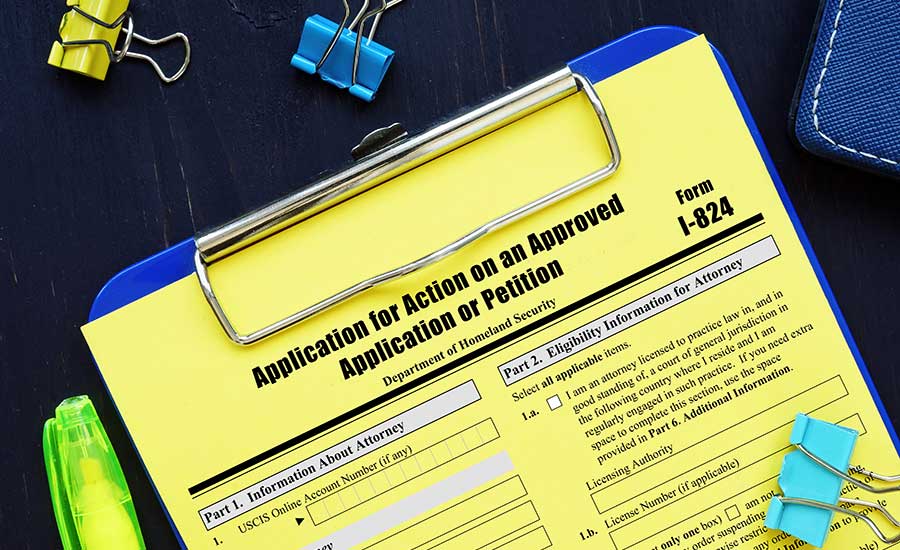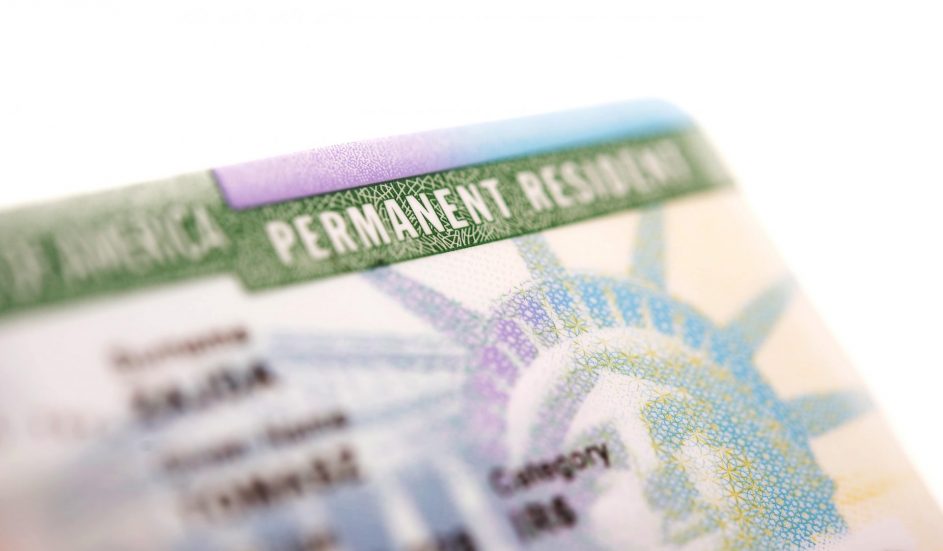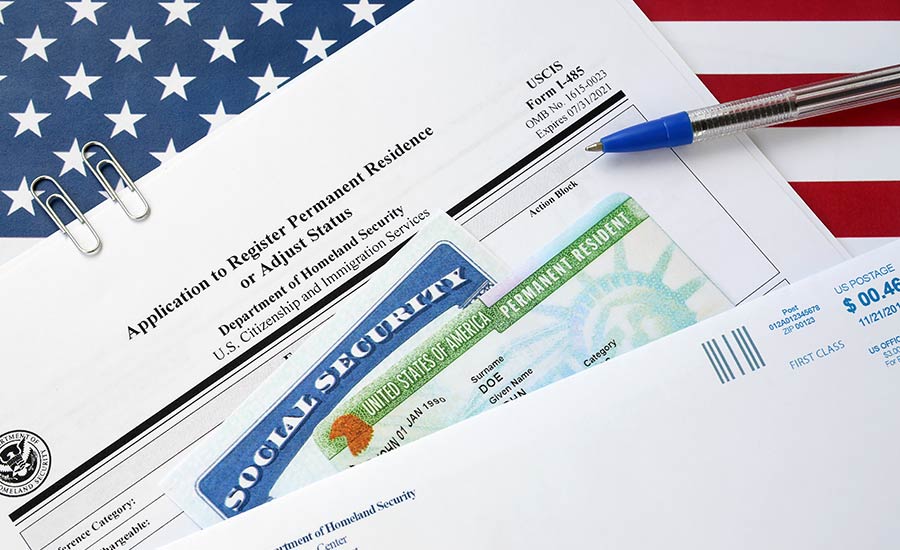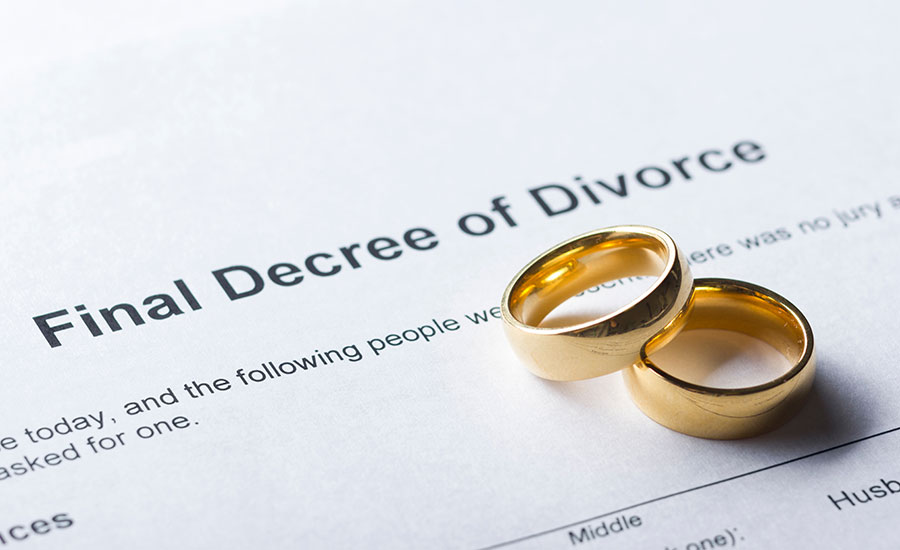

Divorce After a Green Card: Key Takeaways
- Divorce after receiving a 10-year Green Card typically does not affect your immigration status
- Getting divorced before your Green Card is approved will likely terminate your marriage-based application
- If you hold a two-year conditional Green Card and want to remain in the United States, you must file Form I-751 with a waiver
- Work with an experienced immigration attorney to avoid the risk of deportation
As complicated as a divorce can be, experiencing this transition can be even more stressful if your immigration status is at stake.
We’ll explain:
- If divorce can affect your immigration status
- What to expect if you have a pending Green Card application
- What happens after divorce if you have a conditional Green Card
- Effect of divorce on naturalization eligibility
Does Divorce Affect Your Immigration Status?
In some cases, yes — a divorce can have an impact on your immigration status. Whether this happens depends on several factors, including:
- The type of Green Card you are holding at the moment the divorce takes place, whether a permanent Green Card valid for ten years, or a conditional Green Card valid for two year
- The stage at which divorce occurs in your immigration process timeline.
- Whether your status is linked to the immigration status of your spouse.
Typically, if you already hold a permanent Green Card, a divorce is unlikely to put your immigration status at risk.
However, the situation differs if you’re:
- A conditional resident
- A Green Card applicant who is seeking permanent residence through a spouse
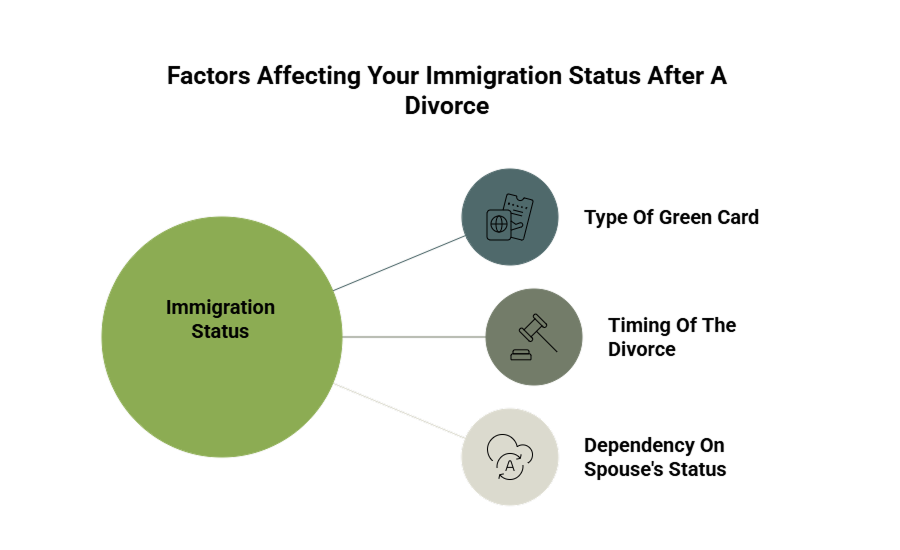
How Does Divorce Affect Your Green Card Application?
If you and your spouse divorce before your Green Card application is approved:
- You become ineligible for a marriage-based Green Card.
- The immigration process is terminated.
That’s because your permanent resident status was related to the relationship you had with your spouse.
The same is true if you file for a Green Card as a derivative applicant seeking immigration status through your spouse. For example, if your spouse held a U.S. employment-based visa and you were listed on their application.
If you and your spouse divorce after your Green Card was approved, you may still be able to remain in the U.S. as a conditional resident.
What Happens To A Conditional Green Card Resident After Divorce?
Divorce after a conditional Green Card can be challenging if your conditional status is related to the immigration status of another person.
When The Divorce Is Finalized
To remain in the U.S. lawfully after your conditional Green Card expires, you must apply for removal of conditions.
- File Form I-751, Petition to Remove Conditions on Residence with the U.S Citizenship and Immigration Services (USCIS).
- Fill out a joint filing requirement waiver that allows you to petition for a permanent Green Card, individually.
- Include supporting documents:
- Your divorce decree
- A written statement explaining the reasons that brought your marriage to an end: irreconcilable differences, domestic abuse, adultery, or more.
- Evidence that your marriage was entered in good faith, such as proof that you lived together, had children together, shared joint financial records, or owned property together.
Note that USCIS takes a close look at waiver requests, so be ready to back your case with clear, honest documentation.
Filing Form I-751 incorrectly can result in removal proceedings (deportation), which is why it’s vital to work with an experienced immigration attorney.
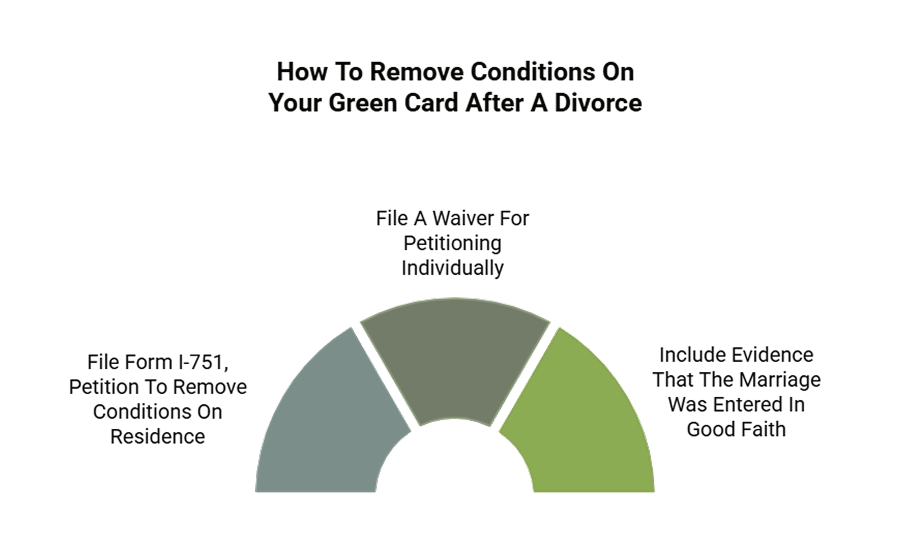
When The Divorce Is Not Finalized
Still waiting for your divorce to finalize? You’ll need to show USCIS that the process is underway to avoid complications with your conditional status.
Typically, USCIS will extend your conditional residence status for an additional year and notify you by mail. You may also receive a Request for Evidence (RFE) for the final divorce decree at a later time.
When You’re Separated But Not Divorced
If you have a conditional Green Card and live apart from your spouse, but you are not divorced yet, you may still be able to apply for removal of conditions.
In this case, you will need to prove that you will suffer “extreme hardship” if you are not granted lawful permanent status and forced to leave the country.
Can Divorce Affect Your Naturalization Process?
If you are single or married to someone who is not a U.S. citizen, you can apply for naturalization after having your Green Card for five years.
If you divorce after getting a marriage-based Green Card and being a permanent resident for five or more years:
- Your eligibility for naturalization will not be affected.
- Apply by submitting Form N-400, Application for Naturalization.
If you have been a permanent resident for less than five years, and then you get a divorce, you may face two scenarios:
- If you divorced before filing your petition for naturalization, you must wait the entire five years, just as any Green Card holder would have to.
- If you filed your petition for naturalization and get divorced before it was approved, you may need to withdraw it and re-apply, five years after you obtain your Green Card.
Note that your application for naturalization will mean that USCIS will need to review your full immigration file. If they are suspicious that your marriage was fraudulent, they may require you to submit additional evidence.
Does Divorce Complicate Green Card Renewal?
If you have a permanent Green Card at the time of the divorce, your Green Card renewal is unlikely to be affected.
- Submit Form I-90, Application to Replace Permanent Resident Card (Green Card).
- You can also have your name changed on the card. To do so, include a divorce decree or another legal document showing your legal name change.
Need Help To Stay in the US After A Divorce? Spar & Bernstein Can Help
Representing immigration clients in all 50 states and worldwide, our team at The Law Offices of Spar & Bernstein hears unique immigration stories each day and works with clients at all stages of the immigration process, handling each case with the utmost care.
From family and employment immigration to waivers and asylum and refugee protection, our knowledgeable and compassionate team of lawyers fights to reach a successful outcome.
If you are going through a divorce or have recently divorced and feel concerned about your immigration status in the U.S., we can help with:
- Removing conditions from your Green Card
- Applying for naturalization
- Applying for Green Card renewal
Contact our qualified team and set up a consultation. We’ll review the details of your case and explain the legal options that will help protect your status and help you remain in the U.S.
Divorce After a Green Card: FAQs
Can I stay in the US after divorce if I have a Green Card?
Yes, if you already have a 10-year permanent Green Card, divorce generally will not impact your legal status. If you have a 2-year conditional Green Card, you will need to file Form I-751 with a waiver and prove that your marriage was entered in good faith.
Can I remarry and reapply for a Green Card if my first marriage ends in divorce?
Yes, if your first marriage ends in divorce and you later marry a U.S. citizen or permanent resident, you can start a new Green Card application. Note that USCIS may scrutinize your new marriage more closely, especially if the first marriage was short.
Can I file for VAWA if my spouse was abusive?
Yes, if your U.S. citizen or lawful permanent resident spouse abused you, you may self-petition for a Green Card under Violence Against Women Act (VAWA), even if you’re divorced. Contact our experienced and compassionate team at Spar & Bernstein and we’ll help with the process.
Disclaimer: attorney advertisement. prior successful results do not guarantee a similar outcome



